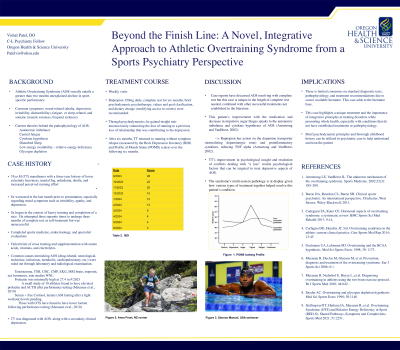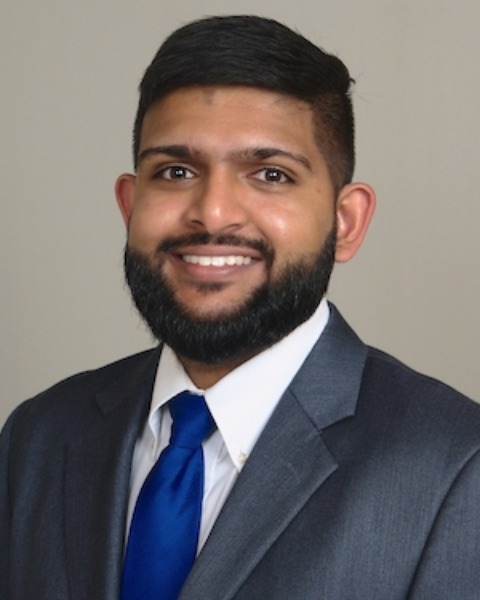Collaborative and Integrated Care
(050) Beyond the Finish Line: A Novel, Integrative Approach to Athletic Overtraining Syndrome from a Sports Psychiatry Perspective


Vishal Patel, DO
Fellow Physician
Oregon Health and Science University, Oregon
Presenting Author(s)
Implications: This case highlights a unique treatment and the importance of integrative principles in treating disorders while promoting whole health, especially with conditions that do not have established treatments or pathophysiology. Armstrong LE, VanHeest JL. The unknown mechanism of the overtraining syndrome. Sports Medicine. 2002;32(3):185–209. Baron DA, Reardon CL, Baron SH. Clinical sports psychiatry: An international perspective. Chichester, West Sussex: Wiley-Blackwell; 2013.
Background: Athletic Overtraining Syndrome (AOS) usually entails a greater than two months unexplained decline in sport-specific performance, with mood-related (abulia, depression, irritability, distractibility), fatigue- or sleep-related, and somatic (muscle soreness, frequent sickness) symptoms being common. There is limited consensus on standard diagnostic tests, pathophysiology, and treatment recommendations due to scarce available literature. This case presents a novel, integrative perspective on successful treatment of AOS while shining light onto its pathophysiology.
Case: TT is a 52 year old male marathoner who presented to clinic with a three-year history of lower extremity heaviness, mental fog, anhedonia, abulia, and increased perceived running effort that worsened in the last month prior to presentation, especially regarding mood symptoms such as irritability, apathy, and depression. Symptoms began in the context of heavy training and completion of a race. He attempted three separate times to undergo three months of complete rest as self-treatment but was unsuccessful. He completed sports medicine, endocrinology, and specialist evaluations and failed trials of cross training and supplementation with amino acids, vitamins, and electrolytes. Common causes mimicking AOS (drug-related, neurological, endocrine, infectious, metabolic, cardiopulmonary, etc.) were ruled out through laboratory and radiological examination. TT was diagnosed with AOS, along with a secondary clinical depression. Bupropion 150mg daily, complete rest for six months, brief psychodynamic psychotherapy, values and goal clarification, and dietary change (modifying access to sweets) were recommended. Through psychodynamics, he gained insight into unconsciously connecting the loss of running to a previous loss of relationship that was contributing to his depression. After six months, TT returned to running without symptom relapse (measured by the Beck Depression Inventory (BDI) and Profile of Moods States (POMS) scales) over the following six months.
Discussion: TT was thought to have clinical depression, and not solely AOS, due to the cognitive and social role of his dysfunction (vs. only sport performance dysfunction) and symptoms worsening with rest (Barron et al., 2013). Case reports have discussed AOS resolving with complete rest but this case is unique in the length of complete rest needed, combined with other successful treatments not established in the literature. This patient’s improvement with the medication and decrease in impulsive sugar binges speaks to the autonomic imbalance and cytokine hypotheses of AOS (Armstrong and VanHeest, 2002). Bupropion has action on the dopamine transporter (normalizing dopaminergic tone) and proinflammatory cytokines, reducing TNF alpha (Armstrong and VanHeest, 2002). TT’s improvement in psychological insight and resolution of conflicts dealing with “a loss” credits psychological factors that can be targeted to treat depressive aspects of AOS. The syndrome’s multi-system pathology is at display given how various types of treatment together helped resolve this patient’s condition.
References:
Presentation Eligibility: Not previously published or presented.
Diversity, Equity, and Inclusion: This submission advances DEI as the patient comes from the historically disadvantaged population of Appalachia, which has high rates of serious mental illness. Documentation of this case furthers knowledge for this population. Also, the speaker is an Indian osteopathic physician. There are a limited number of Indian physicians in Sports Psychiatry and addressing this improves relatability to athletes of similar cultures. Athletes are an underrepresented population in mental health literature. Athletes come from diverse backgrounds and AOS is an underrecognized condition. Adding evidence to this field promotes equity in mental health, especially when integrative low-cost approaches are studied.

